'I'm mixed-race, is Cambridge University right for me?'
- Published
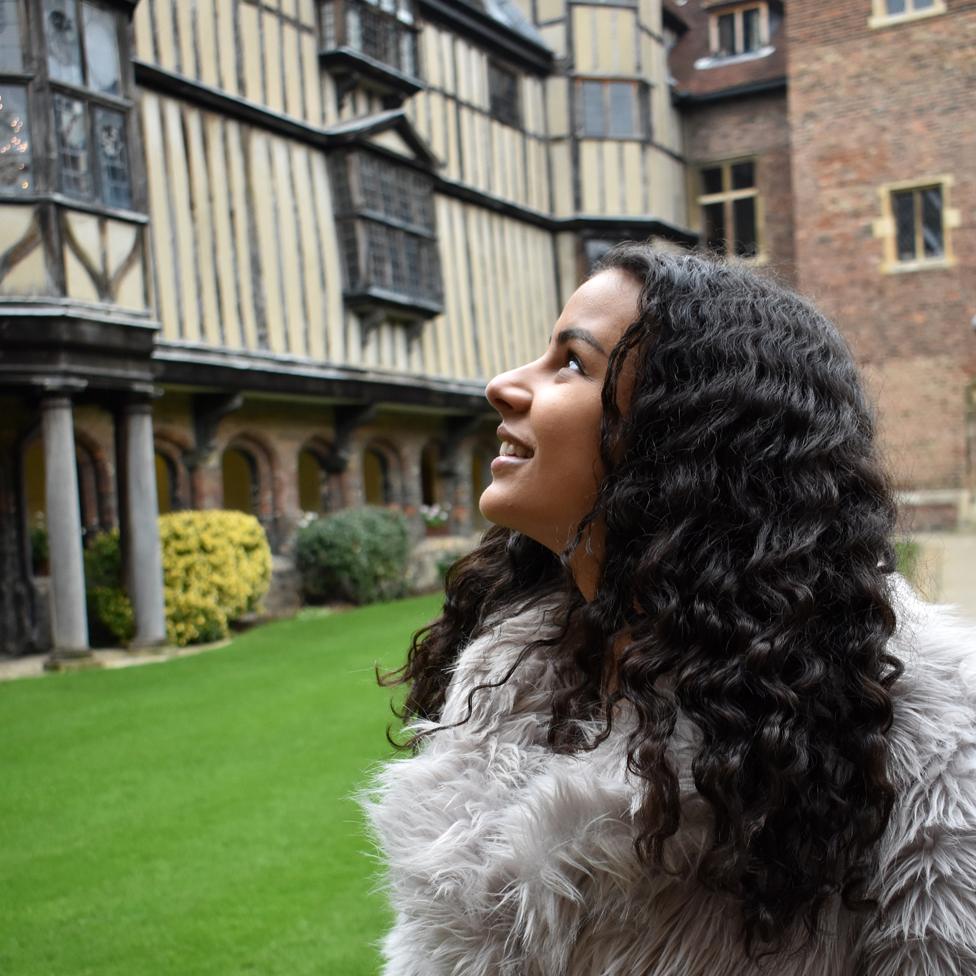

Anoushka Mutanda Dougherty has been offered a place at Cambridge University, but she's mixed-race and from a state school - and only 3% of students who started at Cambridge in 2017 were black, or mixed-race with black heritage. So is it the best place for her? At this point, she's not sure.
Cambridge is the second-oldest university in the English-speaking world. Cambridge is the fourth-oldest surviving university in the world. Cambridge has produced, so far, 90 Nobel prize winners - and Cambridge, this educational powerhouse, just might not be where I want to go. At least, that's how I feel right now, a week after finding out that I got a place.
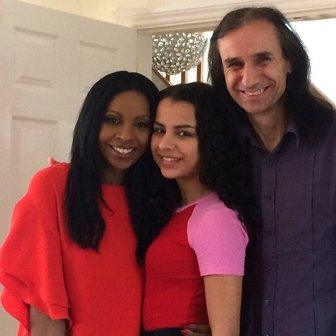
Anoushka's applications provoked some fiery discussions at home
It was my parents who first encouraged me to try for Cambridge. They see it as a passport to the best jobs and opportunities. But I worry about what life would be like in a university which still admits quite a high proportion of pupils from private schools, and where I would be one of only a handful in my year from a mixed white/Black African family - in 2017 there were just 14. There's no escaping the fact that Cambridge is a majority white and majority posh (!) institution.
My mum, Anjula, is Ugandan and fled from Idi Amin's tyrannical regime in the 1970s. The story of people like her with a mixed Indian and Ugandan background is largely overlooked from accounts of racial tension in Uganda, and there's little understanding of the struggles she and others faced once they arrived in the UK. The experience of minority communities has helped shape my interest in unwritten histories (you try explaining this in a UCAS statement with a limit of 4,000 characters) so it stands to reason that I would focus on racial diversity in the universities I'm considering.
In the mix are Birmingham, Bristol, Cambridge and King's College, London.
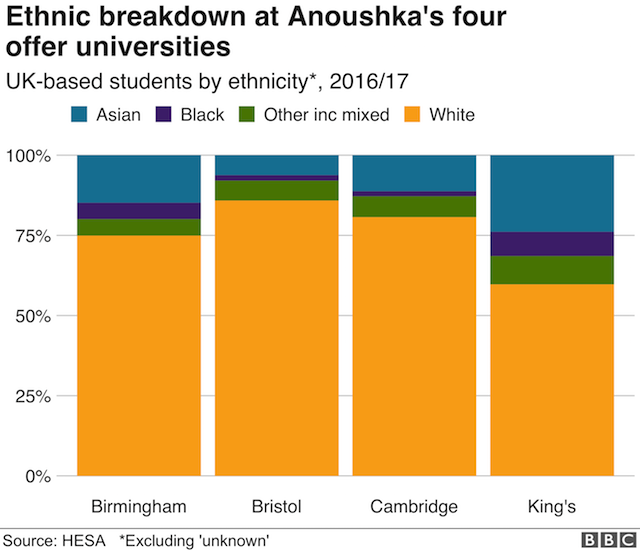
They all offer history courses that I would love, but widely differing student experiences. It's this caveat that has led many of my friends - even the most academically able - not to apply to Oxbridge. In some cases it's the fear of being worked so hard that there's no time for social life, in others it's the fear of being pushed to behave like someone from a specific socio-economic group, just to fit in.
Touring campuses and speaking to students has helped me a lot. At Cambridge I met Nicole, one of the black students accepted last year. She told me that it was a shock to come from London to a place with so few black students. Her mum had pushed her to apply and when she got offered a place she accepted.
"I guess when you get an offer from Cambridge, you've kind of got to say yes," she said. "Like, well, that's what I thought anyway."

Find out more
Listen to Anoushka's story on Should I study at Cambridge? on BBC Sounds
The programme was made by Sue Mitchell for The Untold, on BBC Radio 4

She quickly adapted to the new environment, so the real shock came when it was time to go home at the end of her first term, she says.
"I hadn't gone back before and when I did I was at the train station [in London] and I was like, 'Why are there so many black people here?' I was just so used to not seeing them."
I got the sense that she struggles with some aspects of student life and asked her about this.
"Sometimes I have thought, 'Do I belong here?'" she said, "which I've never thought in my life before."
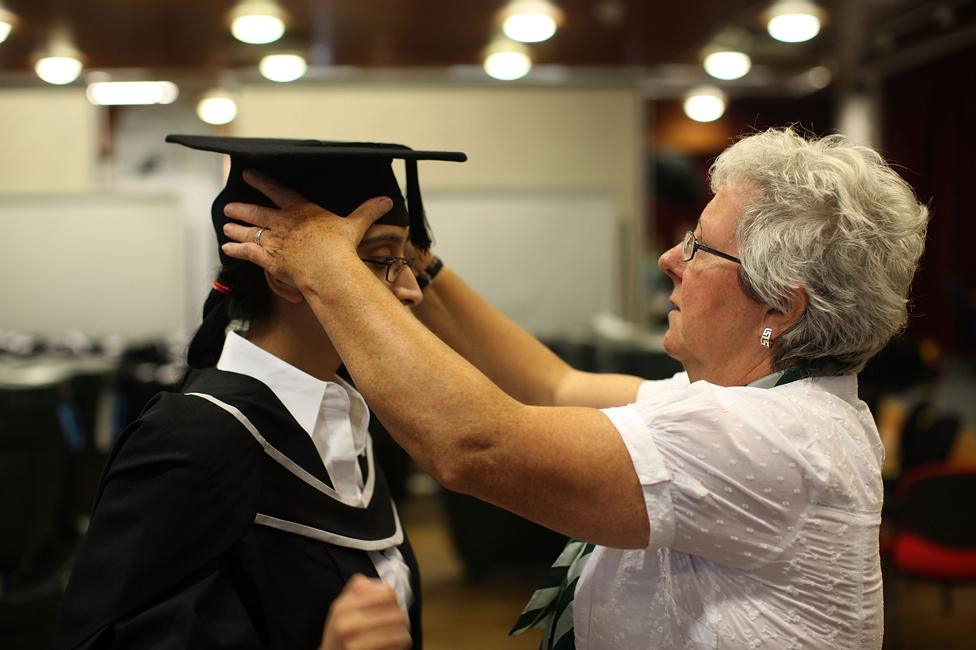
A student prepares for graduation at University of Birmingham
This worried me, as did her lament that there was just one club that played R&B, and that it charged £12 entry - more than any other student venue she'd been to! Talk about having a monopoly on the market. (And thinking about it, do I want to spend three years in a town where the nightlife is dead?)
On the other hand, Nicole said there were numerous Cambridge societies, and when she went to one of them it was like she had finally discovered where all the black students go. "I have never, like, self-segregated but I did go to a Hip-Hop Society event and I'd just never seen so many black people in one room at one time in Cambridge! I was like, 'Wow, this is where we all are'."
One of Nicole's friends told me that he didn't like talking in terms of "us" and "them" but he too had noticed self-segregation in action. "There's like a sort of a group of 10 black people who always run here," he said. "You notice them because they're always in a group, I suppose."

Cambridge's 2017 intake from UK schools
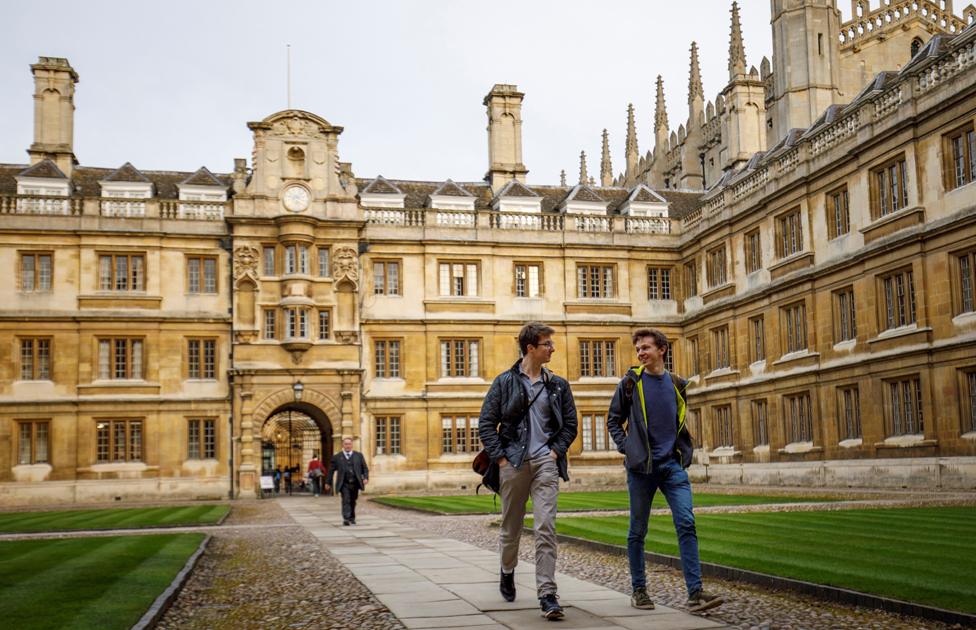
White 77.1%
Asian 11.8% - includes Asian or Asian British - Indian, 5.1%; Asian or Asian British - Pakistani, 1.1%; Asian or Asian British - Bangladeshi, 0.9%; Chinese, 2.9%; other Asian background, 1.8%
Mixed race 6.9% - includes white/black Caribbean, 0.6%; white/black African, 0.5%; white/Asian, 3.9%; other mixed background, 1.9%
Black 2.2% - includes black or black British (Caribbean), 0.2%; black or black British (African), 1.9%; other black background, 0.1%
Other & unknown 2.0% - includes Arab, 0.3%; other ethnic background, 0.7%; gypsy or traveller, 0.1%; unknown, 0.9%
In total 2,612 students were accepted, of which 64% were from state schools (including grammar schools)
Source: Cambridge University undergraduate admissions statistics, 2017 cycle, external

I talked to Kier, a high-achieving mixed white-Barbadian boy at my school, who said the diversity issue was one of the reasons he hadn't considered Cambridge.
"I just thought the people at Cambridge wouldn't be the people in my crowd," he said. "I don't want to be with so many white kids from private schools."
I also took it up with my mixed-heritage girlfriends. We're used to swapping notes about being in the minority - we go to school in Kent, after all: we notice that we get labelled as bossy and loud when we're just confident and outspoken; we share comments about our hair. (I have to give a special mention here to my white friend who, for the first three years that we knew each other, thought that I curled my hair every morning.) Just like Kier, who wants to study with people in his crowd, my girlfriends said they wanted to share university accommodation with students who "look like them".
"Some unis are just for, like, those posh people, isn't it?" said Caitlin. "Like, I think it just happens that a lot of the private school kids are more white around here - so that's what happens."
One of the things I noticed at the Cambridge open day was how many of the prospective students were with parents who had studied there.
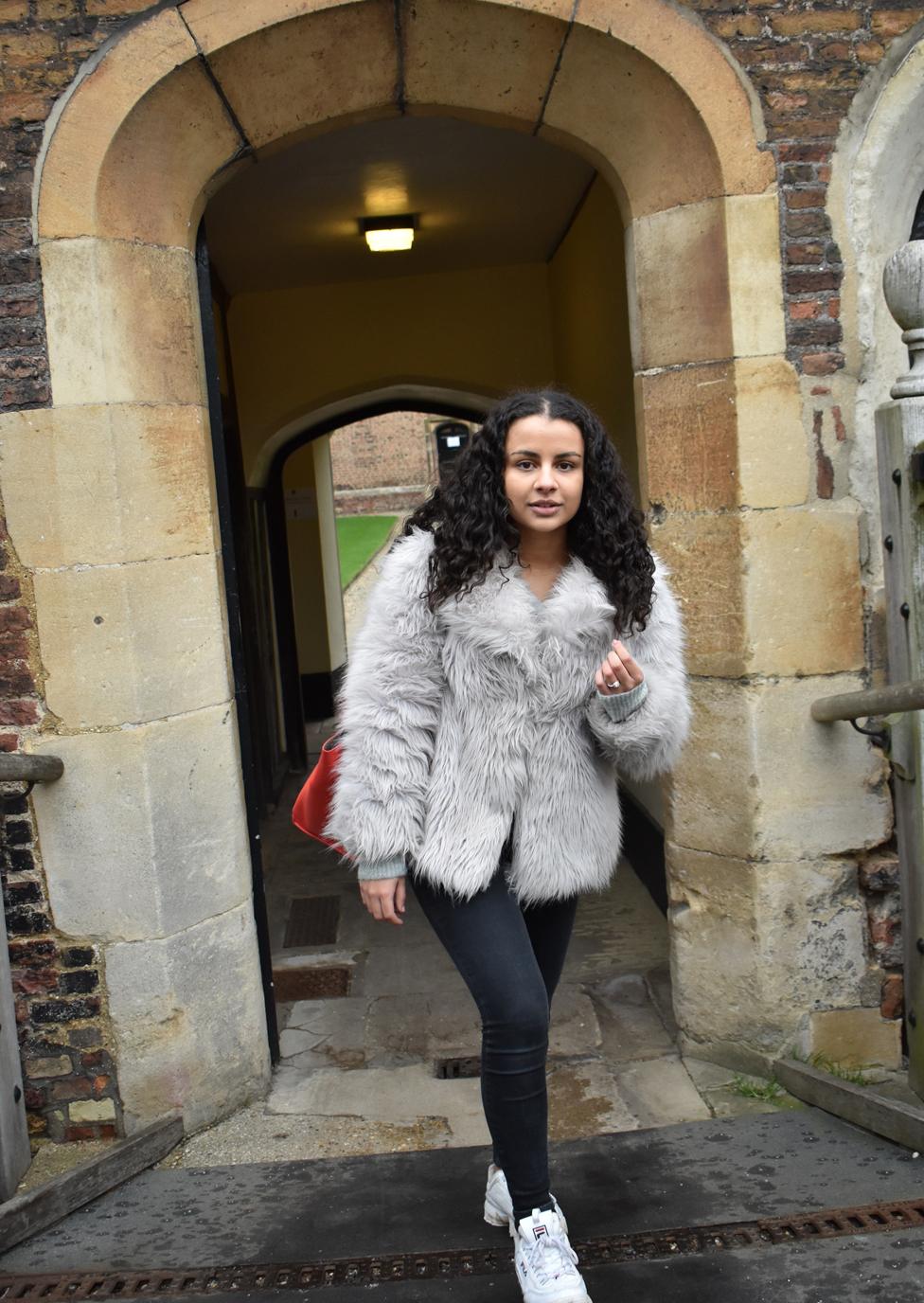

Alex was with his mum, Rosie, who had fallen in love with the city when she was our age, making her own choice about which university to go to. I asked her about the racial imbalance and the relatively high number of students from private schools... wouldn't she want her son to be somewhere that more reflected the real world?
"That's a good question. I mean I think I'd like him to go just wherever he'll do really well and enjoy it but I must admit, I'm probably not choosing or thinking about where he should go from that basis," she said. "You know, I just want him to go where he'll get the best degree for what he wants to do."
In my home, the pressure surrounding the application process provoked a few fiery family discussions. (But it's good to vent, right?) My mum and dad both said Cambridge would be mad not to want me. (OK, maybe they are a tad biased.) However, we've also had a lot of time to reflect on where I would be happiest.
My dad, Roy, summed up his position like this: "At the end of the day, I would like it if you get a place there - not on the basis of positive discrimination but because you're good enough and they've given it to you rather than someone from a school they've used for 300 years, or someone who's got all these connections."
He's convinced that I'd achieve a sense of belonging there. "I think it all depends on whether you find your group, your tribe... whether you can find the right group of people that are into things that you're into, and know the way you are - because it's also about personality as well."

A student in the Maughan Library at King's College London

The interview at Cambridge was not at all how I expected it to be, apart from it being with four white male academics - I did expect that.
It was fun and exciting. Thought-provoking and not even that scary. Did I decide to wear a pink fur coat that made me look like a relic of an early-2000's 50 Cent video? Yes. Did I question this after taking my admission test with a room of prospective law students, who were all suited and booted and ready for employment in the City? Yes.
That aside, I sat in a room with academics who were willing to listen to my ideas and explore my reasoning in a way that was encouraging and interesting - though maybe I would feel less positive about it if I hadn't got in.
I took some of my concerns about racial diversity - or the lack of it - to the press officer at Cambridge University, Paul Seagrove. He said that 58 black students got places in 2017, which was higher than the figure of 39 for 2016.
"We recognise that it is still too low," he said.
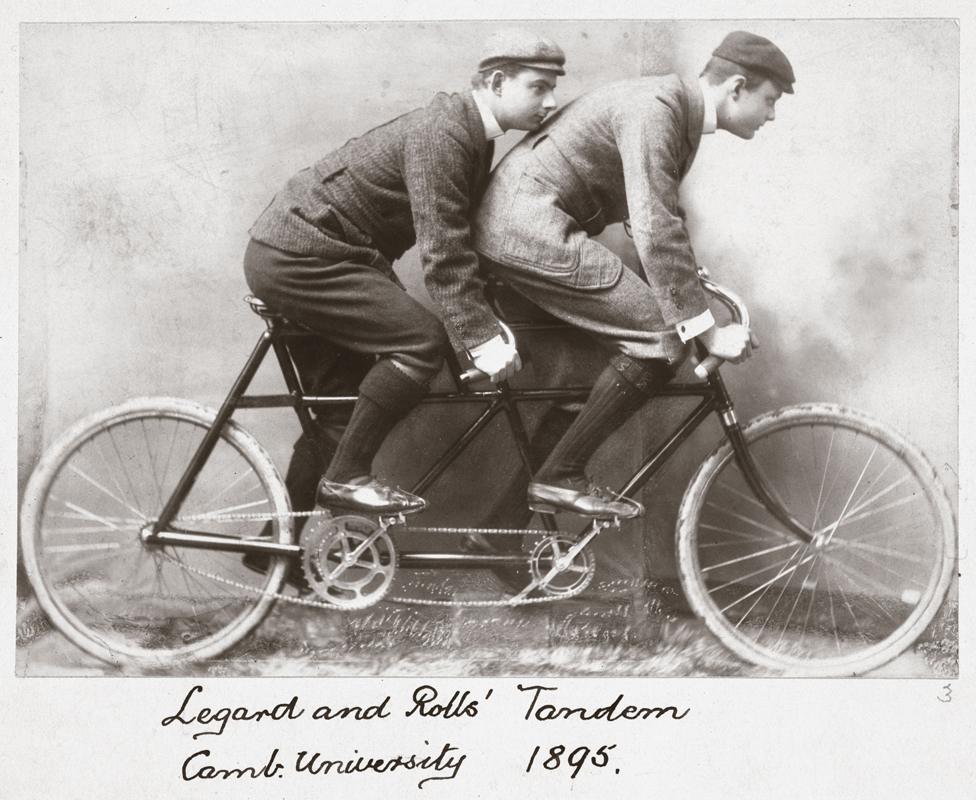
The Hon Charles Stewart Rolls, co-founder of Rolls-Royce, studied engineering at Cambridge - today working-class students are also encouraged to apply
But he added: "What is worth bearing in mind is that this number represented a third of all black students admitted to higher education in the UK that year who attained A*A*A at A-level. So there is a problem with attainment levels in schools which we, alone, cannot fix."
Paul described outreach activities that are trying to "bust the myth that Cambridge isn't the right place for someone like me". For example, it's trying to get more black school students to attend an Easter residential course that gives them a taste of university life.
It seems that there is a self-perpetuating cycle. Smart kids from diverse backgrounds won't apply because they think they won't fit in, because they don't see people like them. This in turn means that the demographic of students will never change, so the view that it's not the right place for people of colour will persist.
Is it right for me? I've got to decide by May.

You may also be interested in:
Black and minority ethnic students of all backgrounds are punching above their weight when it comes to representation at UK universities.
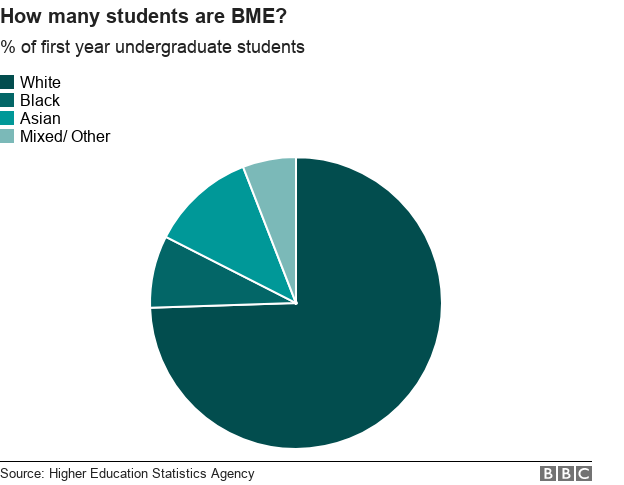
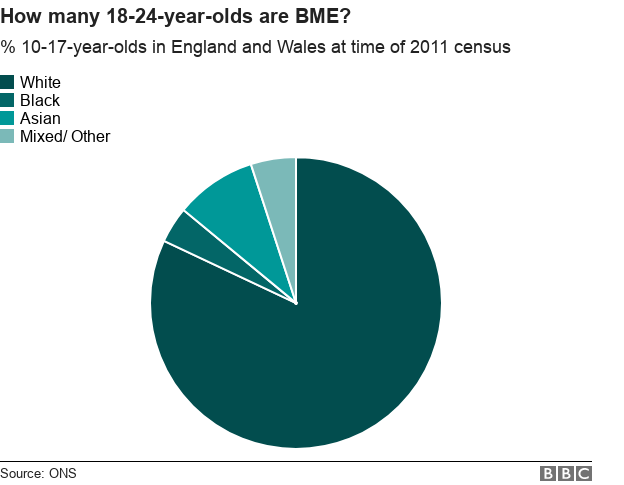
Read: Five charts that tell the story of diversity in UK universities
Join the conversation - find us on Facebook, external, Instagram, external, YouTube, external and Twitter, external.
